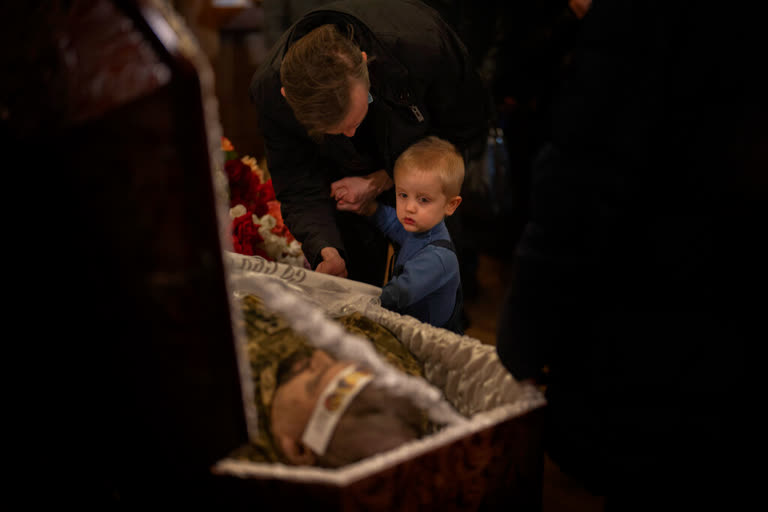Russian President Vladimir Putin went ahead with his plan of legitimising more than a decade-old separatist movement which his government has been backing in the two breakaway regions -- Donetsk and Luhansk People’s Republics -- of Ukraine regardless of the strong opposition from the West. Putin in his address after the Russian Security Council meeting on Monday recognised the two conflict regions as independent nations part of Ukraine as per the Minsk agreement.
The US and European nations along with the UN, have frowned upon at the Russian security council’s decision. They have called it an attack on the sovereignty of Ukraine. The decision is seen as unilateral and in violation of the Minsk II agreement. The previous charter came to be known as Minsk I agreement was executed in September 2014. It broke down following violations by both Russia and Ukraine.
In February 2015, the Minsk II agreement was signed between Russia, Ukraine, the Organisation for Security and Cooperation in Europe (OSCE) and separatist leaderships of the two breakaway regions in the Belarusian capital Minsk. The 13 point-charter seems to have been brushed under the carpet by the fresh conflict between Russia and Ukraine these days. The 13-point agreement is as follows :
- Ceasefire from all sides
- Heavy weapons to be withdrawn by either side
- An exchange of hostages and prisoners
- Humanitarian aid to be provided to the regions
- Socio-economic activities to be resumed between the territories including the pensions schemes
- Complete control of state borders by the Ukrainian government
- Foreign armed men, their installations and equipment to be withdrawn
- Reforms in the Ukrainian constitution including decentralization, with special attention on Donetsk and Luhansk
- Electoral activity in Donetsk and Luhansk on terms to be agreed with their representatives
- Trilateral Contact Group which includes representatives of Russia, Ukraine, and the OSCE to intensify their activities
- OSCE to monitor and verify
- A dialogue on the formation of an interim government in recognising the special status of Donetsk and Luhansk regions by parliamentary resolution of Ukraine and to start a truce for making an interim government in the disputed region
- General amnesty for people involved in resistance against the Ukrainian government
Notwithstanding the deal, there has hardly been any major respite in separatist activities in the regions backed by Russia. In the meantime, the separatists were able to consolidate their bases which led to the escalation of the conflict. Equipped with Russian support, the separatists, the US claims, are ready to fight Ukrainian forces.
Also read: Putin gets no support from UN Security Council over Ukraine
Given the approach Russia has adopted, it looks that it has weighed the situation well to find it suitable for the nation to defy what the US says is a violation of international laws. Ukraine, for Russia, may have gone way too far this time in its proximity with the West, something that Putin cannot swallow. Ukraine is one of the 15 break-away countries of the disintegrated USSR.
Former Russian President Boris Yeltsin had a desire to revive the country as an antiquated throwback. He laid the foundation for annexing the breakaway states which Putin is now attempting to fulfil. It was Yeltsin who brought Putin to the limelight in 1999 after he fired Prime Minister Sergei Stepashin and made him the Prime Minister of Russia. Yeltsin expressed his desire to see Putin as his successor when he saw him active in the country's attempt to invade Chechnya amidst opposition from the West in the 1990s. Putin, the former KGB (Russian Intelligence) officer, has been living up to the expectations supporting the insurgencies or any separatist movement that Yeltsin had backed.
Also read: Russia flexes military for Ukraine move; West to respond
Putin, while addressing the extraordinary meeting of the security council, said the Russian deployments to be made in Donetsk and Luhansk would be ‘peacekeepers’. The West has ridiculed Putin's claim. Putin has also instructed his foreign ministry to make 'diplomatic relations' with the 'independent republics'.
Putin's decision has buried the Minsk II agreement signed after the violent conflict over the breakaway regions of Eastern Ukraine. The West foresees a war in the region. They believe Russia has prepared its military for a complete invasion of the territory. The information war has already begun from both sides. Russia alleges Ukraine has made incursions on the eastern side of the border, which Ukraine dismissed as a lie.
Now the question is: who will benefit from the war the most? In an attempt to end the hostilities between Ukraine and Russia, the United Nations Security Council convened an emergency meeting on Tuesday in which most of the members criticised Russia for recognising the breakaway regions as 'independent nations'. Whether Russia will succumb to the world powers by withdrawing its forces besides de-legitimising the secessionist regions - Donetsk and Luhansk or will continue its efforts on full-scale invasion, remains to be seen.



